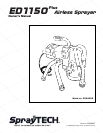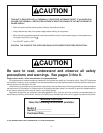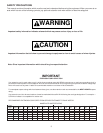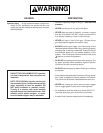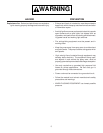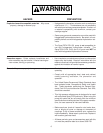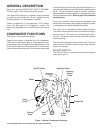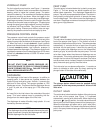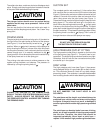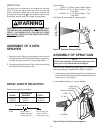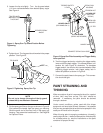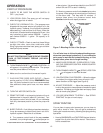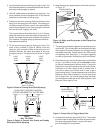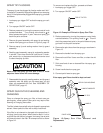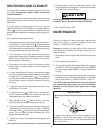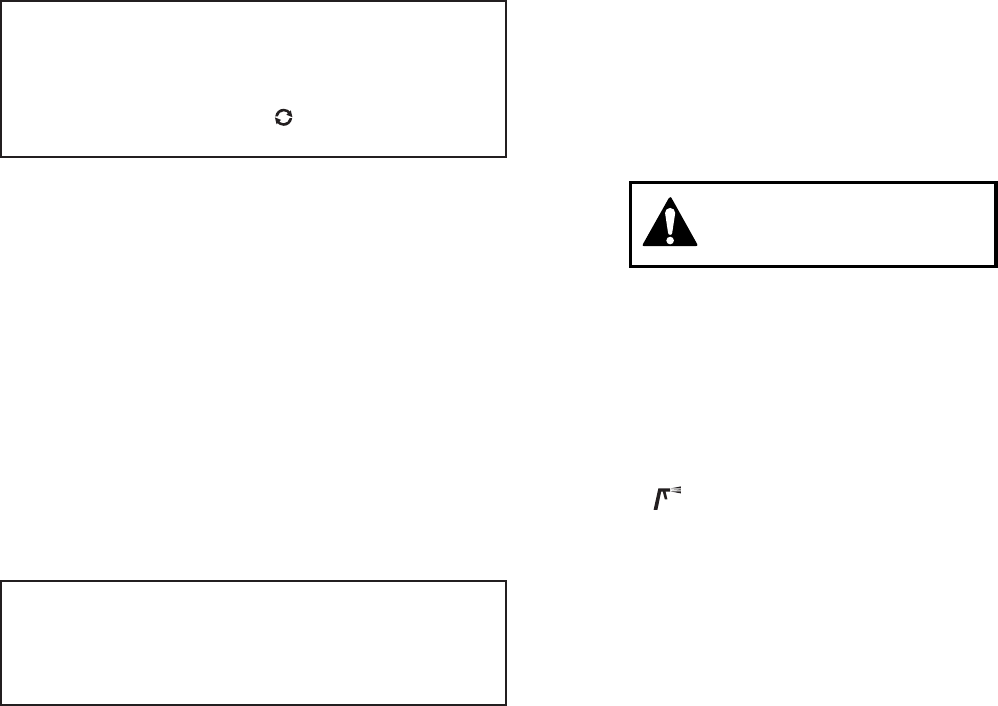
8
The paint pump is located below the hydraulic pump (see
Figure 1). The two pumps are bolted together by four
socket head capscrews. The diaphragm separates the
pumps. The paint pump operates as follows: The piston in
the hydraulic pump forces hydraulic oil toward and away
from the diaphragm. This action moves the diaphragm up
and down. Diaphragm movement forces paint through the
spray gun at high pressure.
DIAPHRAGM
The diaphragm is the heart of the sprayer. In addition to
pumping paint, it also serves as a gasket between the
hydraulic pump and paint pump. As such, it prevents the
paint and oil from mixing. The sprayer operates at 1725
strokes per minute. This means that the diaphragm forces
a “gulp” of paint out of the spray gun 1725 times every
minute.
An insert fits in the inlet hole on the underside of the paint
pump. This insert reduces wear by protecting the dia-
phragm from the metal edges of the inlet hole.
The diaphragm is made of flexible, tough plastic. It is not
harmed by common solvents.
NOTE
The diaphragm should be replaced whenever the paint
pump is removed. Using the old diaphragm will result in
limited diaphragm life and fluid leaks.
For the hydraulic pump location, see Figure 1. It operates
as follows: The electric motor is connected to the eccentric
bearing, which is inside the hydraulic pump. The piston
rests on the bearing. The movement of the bearing causes
the piston to move up and down. When the trigger on the
gun is pulled back, this action moves the pump diaphragm.
Diaphragm movement forces the paint through the outlet
valve and out the paint hose and spray gun. The paint goes
through the spray gun at high pressure, causing it to break-
up (atomize) into fine particles. This gives a smooth and
even paint coating. Pressure and delivery rate are regu-
lated by the pressure control knob and spray tip size.
PRESSURE CONTROL KNOB
The pressure control knob controls the pressure control
valve. It is manually operated. It is located on the front of the
hydraulic pump near the bottom of the sprayer (see Figure
1). When the knob is turned cIockwise, more hydraulic
pressure is directed toward the diaphragm. When the knob
is turned counterclockwise, less hydraulic pressure is
directed toward the diaphragm. The pressure control knob
regulates the pressure on the diaphragm from 0 PSI when
turned fully counterclockwise to 3000 PSI when turned
fully clockwise.
HYDRAULIC PUMP
PAINT PUMP
INLET VALVE
The inlet valve is located on bottom of the paint pump at the
front of the sprayer (see Figure 1). The suction nut end of
the suction tube screws onto this valve. The valve operates
automatically. It controls the flow of paint from the paint
container into the paint pump. It does this by opening up
when the piston and diaphragm are on the downstroke,
allowing a “gulp” of paint to enter the paint pump. The inlet
valve then closes when the piston and diaphragm are on
the upstroke. This closing prevents paint from going back
through the inlet valve into the paint container (inlet valve
acts as a check valve). Instead, the paint is directed out the
spray hose and spray gun by the outlet valve.
The inlet valve is a one-piece configuration. It contains a
device to dislodge a stuck valve by simply pushing the
plunger button on the side of the valve body.
NOTE
DO NOT START PUMP UNDER PRESSURE. RE-
DUCE PRESSURE TO ZERO BY TURNING PRIMING
KNOB TO PRIME POSITION . FAILURE TO DO SO
WILL DECREASE MOTOR LIFE.
CAUTION
The plunger button should never be pushed during
operation as this may cause premature failure of the
inlet valve.
OUTLET VALVE
The outlet valve is also located on bottom of the paint pump
at the front of the sprayer (see Figure 1). It operates
automatically, serving as a check valve. When the priming
valve is on (spray) position, the outlet valve directs the
flow of paint out into the spray hose and into the spray gun.
When the diaphragm and piston act to “gulp” more paint,
the outlet valve closes. The closed valve prevents (checks)
paint in the spray hose and spray gun from returning to the
paint pump.



